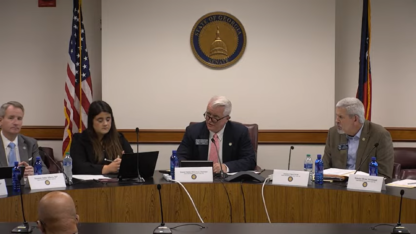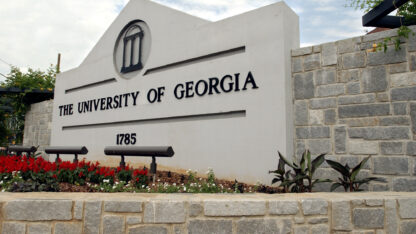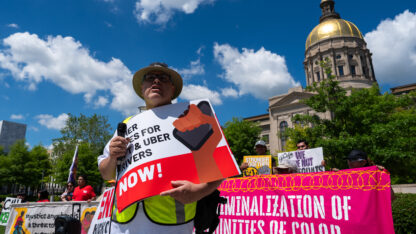The Super Bowl Helped Atlanta’s Rep, But Future Hosts Can’t Count On The Same, Survey Finds

Fans arrive before Super Bowl 53 on Feb. 3, 2019, in Atlanta.
Charlie Riedel / Associated Press
About 35 percent of Americans say they’re more likely to think of Atlanta as a good place to visit because of media coverage of the Super Bowl this year, while 28 percent said they were less likely to visit.
These were the main findings of a national survey by the American Public Media (APM) Research Lab, which questioned 970 people outside of Georgia about their impressions of the city a week after the event.
“A third of Americans said they shifted their impressions of the city positively,” said Andi Egbert, the lead research with APM Research Lab, in an interview. “You know it’s difficult to get one third of Americans to agree on anything so I think that is a notable finding.”
One person surveyed about why they might want to visit Atlanta said: “It just has a deep musical history.”
“It has more attractions, and more things to visit, like historical sites,” said another.
Atlanta welcomed the NFL into town with a public funding tab of $26 million. According to the AJC, that breaks down to $10 million in state tax breaks for ticket sales, and $16 million from the hotel-motel tax.
Estimates for the overall economic impact of the games on the city are as high as $200 million.
Egbert said her lab’s analysis doesn’t answer whether hosting the Super Bowl is worth it, but rather, does the city really benefit from this time in the national spotlight, showcasing itself.
The answer to that appears to be yes, at least for now, although 35 percent of people surveyed couldn’t name the city or state where the Super Bowl was held a week later.
Egbert said while some people cited the bad traffic as a reason not to visit Atlanta, most negative responses were more vague and personal, like “I can’t afford to travel,” or “it’s too hot.”
“So not necessarily anything that is alterable by civic leaders in Atlanta,” said Egbert.
Sixty-three percent of people surveyed knew that the Super Bowl was held in Atlanta and Georgia, and the numbers were higher among southerners, African Americans, and people 35 and older.
But future cities can’t be sure similar positive perceptions of their cities will come from the Super Bowl, and all the media attention in draws, according to a report about the survey.
Just over half of people under 35 knew Atlanta hosted the big game, and 46 percent of all Hispanic Americans surveyed.
“We’re seeing waning influence of the Super Bowl,” said Egbert, “And perhaps American football among younger Americans.”








